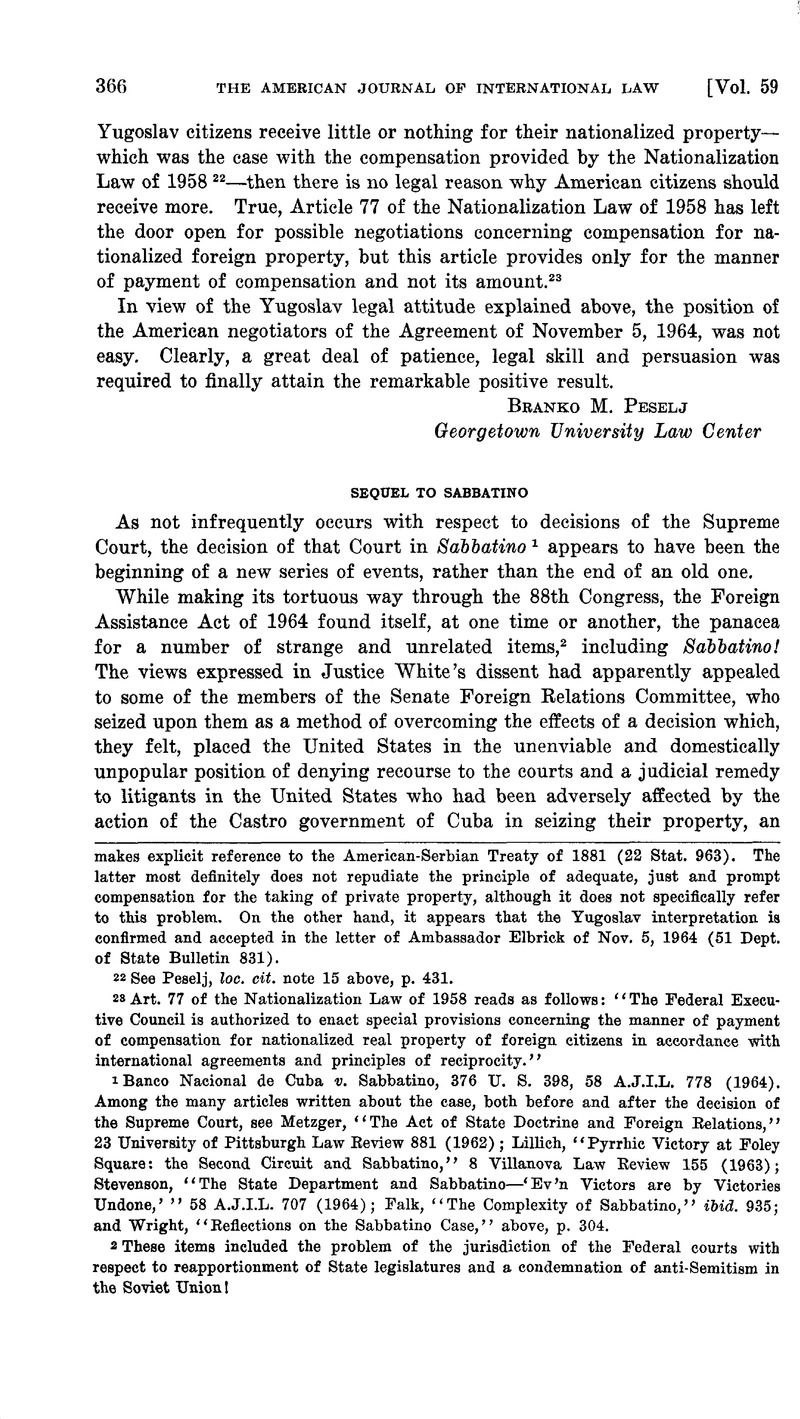No CrossRef data available.

1 Banco Nacional de Cuba v. Sabbatino, 376 IT. S. 398, 58 A.J.I.L. 778 (1964). Among the many articles written about the case, both before and after the decision of the Supreme Court, see Metzger, “The Act of State Doctrine and Foreign relations,“ 23 University of Pittsburgh Law review 881 (1962); Lillich, “Pyrrhic Victory at Foley Square: the Second Circuit and Sabbatino,” 8 Villanova Law review 155 (1963); Stevenson, “The State Department and Sabbatino—'Ev'n Victors are by Victories Undone,’ “ 58 A.J.I.L. 707 (1964); Falk, “The Complexity of Sabbatino,” ibid. 935; and Wright, “Reflections on the Sabbatino Case,” above, p. 304.
2 These items included the problem of the jurisdiction of the Federal courts with respect to reapportionment of State legislatures and a condemnation of anti-Semitism in the Soviet Union!
3 43 Department of State Bulletin 171 (1960).
4 H.R. 11380, 88th Cong.
5 S. Rep. (Foreign Relations Committee) No. 1188, July 10, 1964, 88th Cong., 2d Sess., p. 37. The amendment read as follows: ” (2) Notwithstanding any other provision of law, no court in the United States shall decline, on the ground of the federal act of state doctrine, to make a determination on the merits or to apply principles of international law, including the principles of compensation and the other standards set out in this subsection, in a case in which an act of a foreign state occurring after January 1, 1959, is alleged to be contrary to international law and effect shall not be given by the court in any such case to acts which are found to be in violation thereof; Provided, that this subparagraph shall not be applicable in any case with respect to which the President determines that the act of state doctrine is required in that particular case by the foreign policy interests of the United States and a suggestion to this effect is filed in his behalf in that case with the court.''
6 Ibid, at 24.
7 The New York Times, July 31, 1964, pp. 1 and 6.
8 Public Law 88-633, 78 Stat. 1009.
9 22 TJ.S.C. 2370(e) (2).
10 H. Rep. No. 1925, 88th Cong., 2d Seas., Oct. 1, 1964 (To accompany H.R. 11380), p. 16.
11 To this writer the original Senate language in this regard appears to be sufficiently unequivocal, while the language agreed upon is somewhat redundant. Neither version can be said to represent outstanding statutory draftsmanship.
12 This is not entirely correct. The language of the Act is ‘ ‘ commenced after January 1, 1966.” Accordingly, a proceeding instituted on January 1, 1966, would be timely commenced. The New York Times, July 31, 1964, pp. 1 and 6.
13 376 XT. S. at 425. In this respect, see Stevenson, cited note 1 above, at p. 710.
14 Oetjen v. Central Leather Co., 246 U. 8. 297, 12 A.J.I.L. 421 (1918); Eicaud v. American Metal Co., 246 TJ. S. 304, 12 A.J.I.L. 417 (1918); and Shapleigh v. Mier, 299 V. 8. 468, 31 A.J.I.L. 528 (1937).
15 376 TJ. S. at 430-431.
16 Ibid, at 428-430.
17 It will have been noted that the legislation refers to an act “in violation of the principles of international law, including the principles of compensation. … “ (Italics added.) While the U. 8. Congress cannot, of coarse, make international law, it can indicate the Congressional belief as to what international law in a particular area is. This is what it has attempted to do here with respect to compensation for the taking of the property of aliens.
18 In the Sabbatino case the Supreme Court mandate reversed the Court of Appeals and remanded the case to the District Court “for proceedings consistent with this opinion.“ The case was still pending when the Foreign Assistance Act of 1964 became law on Oct. 7, 1964, with the result that the “Sabbatino Amendment” and its applicability retroactively to Sabbatino itself is now being litigated.